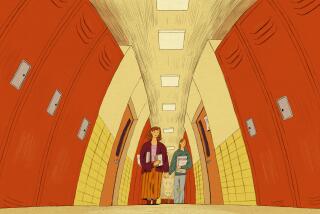These high school grads are the COVID Class of 2023 and have the stories to prove it
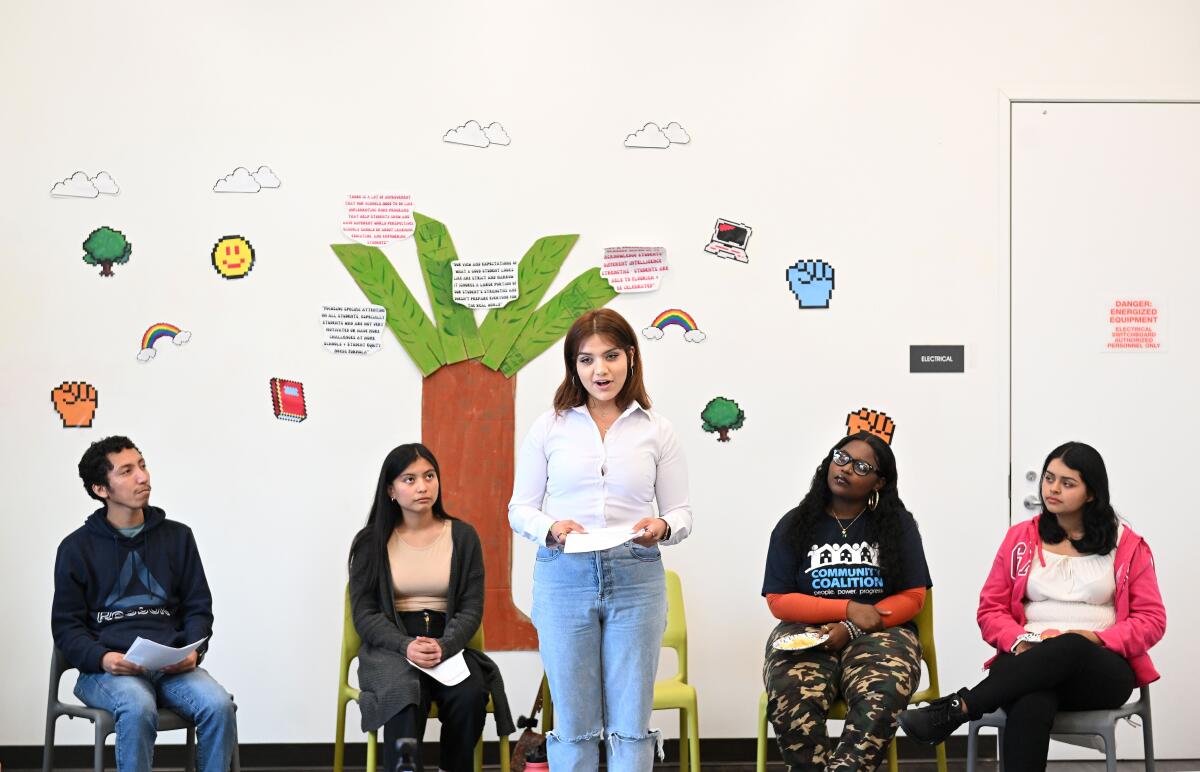
It had only been a week since graduation and these teenagers were giddy. Summer sprawled out in front of them. College is just a few months away â a future some still canât believe will be theirs.
One will be leaving soon to take prep classes at UC Berkeley. Another has an apprenticeship at a Bank of America branch. One dreams of being a congresswoman. But this recent afternoon was not so much about the future as it was about the past.
These students, who attended Los Angeles Unified schools in the Eastside and South Los Angeles, see themselves as the COVID class of 2023. They were first-year high school students when the pandemic forced campus closures in March 2020. Now, when so many have moved on to normalcy, these students explained how the pandemic left a transformative mark on their high school years.
They returned to the classroom as juniors, lives upended, academics in tatters and the pandemicâs emotional fallout palpable.
Gathering at InnerCity Struggle, a nonprofit in Boyle Heights, they described an urgent resilience, a compulsion toward a better future that carried them through waves of grief, the rebuilding of relationships and the stress of college applications. Some talked of their experiences with food insecurity, housing instability, increased anxiety and depression. All of them mentioned the teachers, family and friends who carried them through their four years.
Here are some of their reflections.
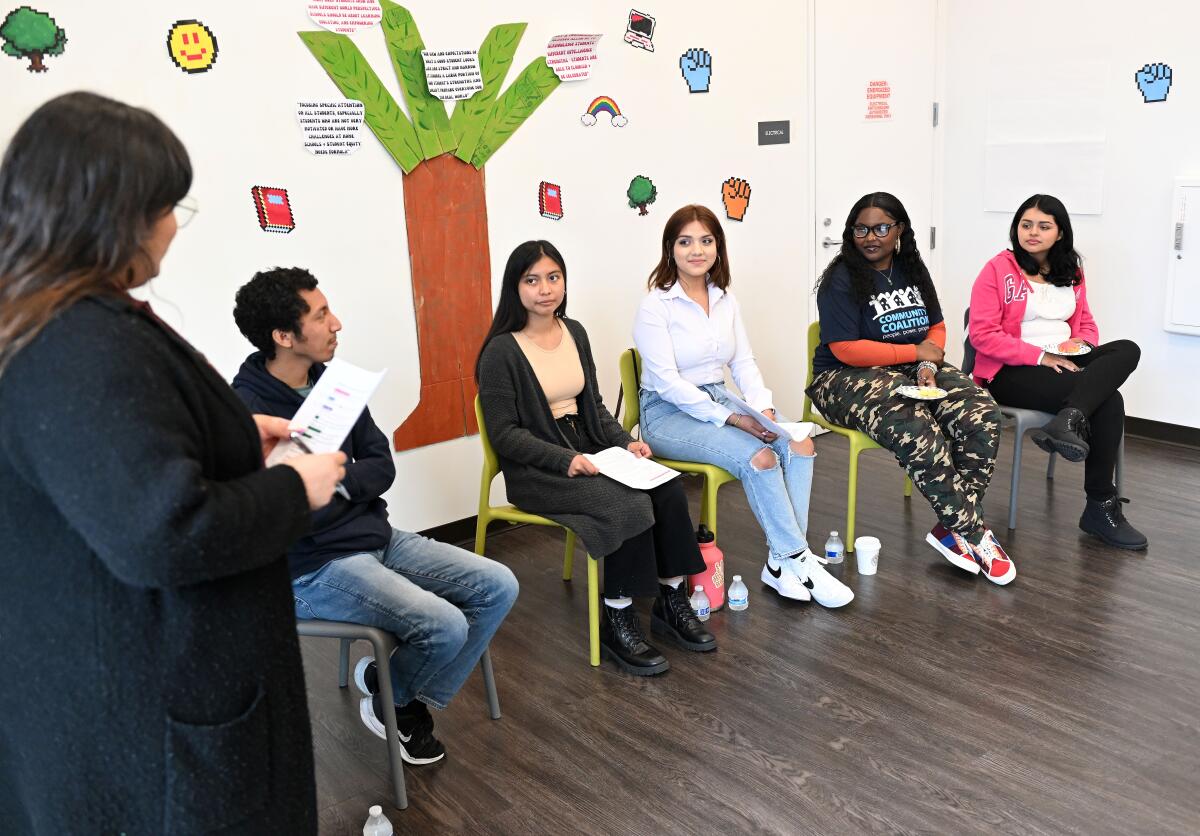
Ana Cristyna Baena Chavez, Roosevelt High School
Ana Cristyna Baena Chavez, 17, moved to Los Angeles in November 2021 of her sophomore year. She had been attending school in San Juan, Mexico, where some public schools come with expenses such as lunch, uniforms and enrollment fees. But her father could no longer afford it, so she and her younger brother flew to Los Angeles alone to pursue their education.
Anaâs father lacks legal status in the United States. Her mother died when she was 8. The two siblings, who are American citizens, joined their 20-year-old sister, Naydelin, who was living with her half-sister.
âItâs not easy not having both of your parents with you. Or having no one to lean on,â she said. âYouâre trying to overcome those facts and youâre trying to go for a better future.â
She enrolled at Roosevelt High School during distance learning. While other students were accustomed to Zoom, Ana had never used it. She remembers fumbling with the buttons â unable to participate and fearing her teacher thought she was not paying attention.
She felt more alone than ever. Her friends were in Mexico; she didnât know anyone in Los Angeles. Her principal connected her with United Students, a leadership program hosted by InnerCity Struggle. Finally adept on Zoom, she played Scribbl.io and Mario Kart with other high schoolers.
When school counselors told her she was far behind, she took credit recovery courses and summer school classes, and loaded up on Advanced Placement courses â earning a near perfect GPA.
But financial pressures bore down on them. Ana and her two siblings moved again to stay with other extended family. She knew the places she lived in were not her home. She leaned on her siblings for support â and remembered the promise she had made to her mother: She would graduate from high school and go to college.
âI think thatâs why I still stick with wanting to go to college and why I donât want to give up even though I donât know what Iâm doing,â she said of her pledge. âI canât give up because of that.â
Ana applied to five University of California campuses, was accepted to three and decided to attend UC Berkeley, where she received the most financial aid.
âIt gave me Harry Potter vibes. The thing that stood out to me most was the library,â she said after a spring visit. âI can see myself studying really hard in this library.â
Though she anticipates difficulties as a first-generation college student, she plans to double major in sociology and finance. She landed a paid apprenticeship at Bank of America learning how to be a bank teller.
When she reflects on where she has felt most at âhomeâ since coming to Los Angeles, she thinks of Rooseveltâs college center, where she was surprised with a bouquet of balloons and applause â she had received the Watkins Fellowship, a $40,000 scholarship awarded through the nonprofit Partnership for Los Angeles Schools. And she thinks of her first friends with United Students and the graduation party she attended with them.
âTheyâre little moments, but theyâre huge to me,â she said. âYouâre not accustomed to having that if you donât have that in your own home.â
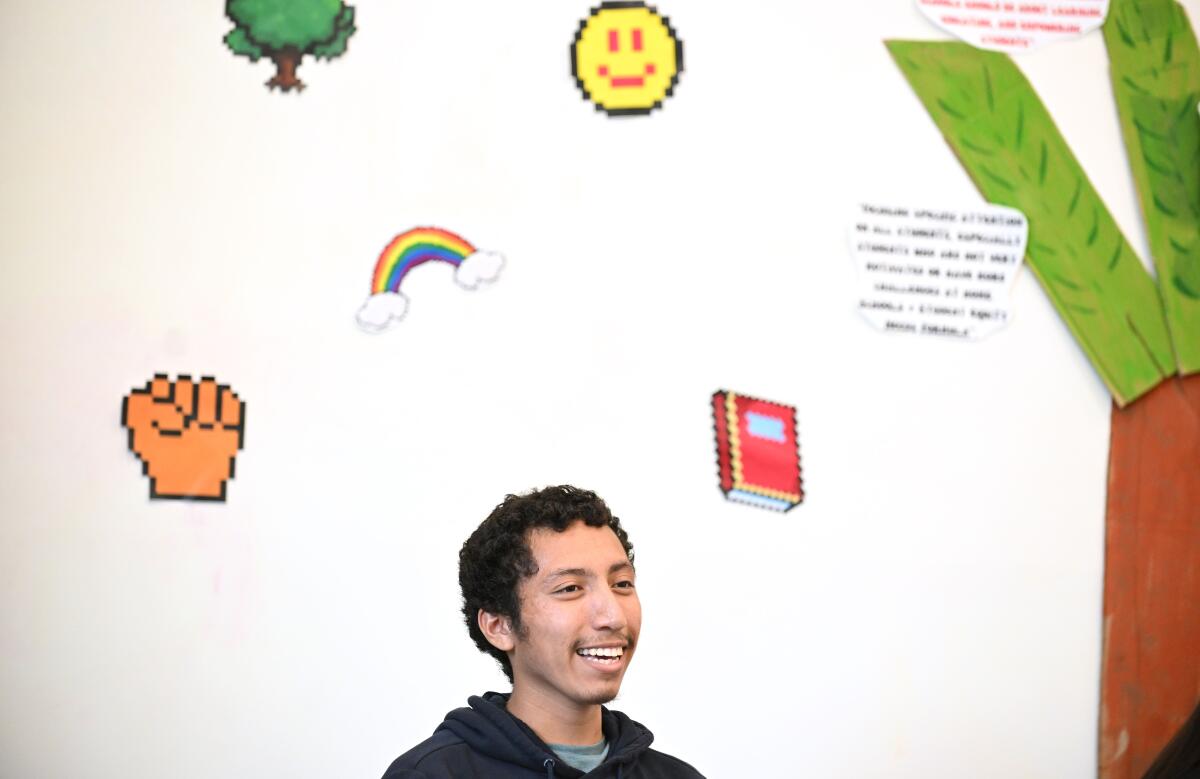
Kevin Valladares, Mendez High School
The pandemic taught Kevin Valladares, 18, how to ask for help.
When the power in his house went out sophomore year during online classes, he frantically texted his AP Calculus teacher from a neighborâs phone. He had test corrections to turn in. Was there anything he could do? He loved math, even if he had failed the first two tests. After years of English as a second language classes, math was something he could comprehend.
â[My teacher] was like, âJust turn it in whenever you get power,ââ he recalled.
âIf I needed something, if I needed more time, it was just a question of me reaching out to my teachers,â he said. âI guess I didnât realize my teachers were human as well.â
Kevinâs parents worked in garment factories, which closed during the pandemic. For two months, they were unemployed. And for the first time, he worried about food.
Humbled, he accepted help from InnerCity Struggle, which gave the family $500 gift cards for food. Kevin would stock the fridge with staples and treated himself to sugar cookies and chips for his brother. Some weekends the family dined on Kentucky Fried Chicken.
Kevin shared a room with his parents and his little brother, his top bunk becoming both bed and desk. His aunt and uncle and their two children shared the second bedroom of the house. He set his alarm every school day for 1 minute before 9 a.m. Then he would roll over, turn on the screen and listen to his teacher. Sometimes, heâd just go back to sleep.
Some days, he babysat his 8-year-old brother, who couldnât sit through Zoom classes. His grades dropped from As to Bs.
When he returned to in-person instruction, it was a new landscape: He didnât recognize some of his classmates and teachers after nearly two years. But he found motivation among students and the friendly competition for grades â and his rose back to As. New friendships grew: small talk in Mandarin class turned into a daily wave hello, then swapping Instagram handles and hanging out after school.
âThe pandemic was so long. I was like, âIâm never getting out.â And then I stepped foot on campus and I was like, âWait, what happened to never getting out? Iâm a junior now,ââ Kevin said.
He was elected student body president. âIt was that realization that we have a voice in school,â he said. âSchool is about the students.â
He found that students and teachers were drawn to his ability to listen to their concerns â clubs that had faltered during the pandemic, insufficient mental health programs, a lack of free menstrual products in restrooms.
When it came time for college applications, Kevin applied to four UCs and four CSU campuses. He was accepted into UC Berkeley with a full scholarship from the Jordan Brand Wings program. This summer, heâll take two classes to get ahead at UC Berkeley, where he plans to major in mathematics.
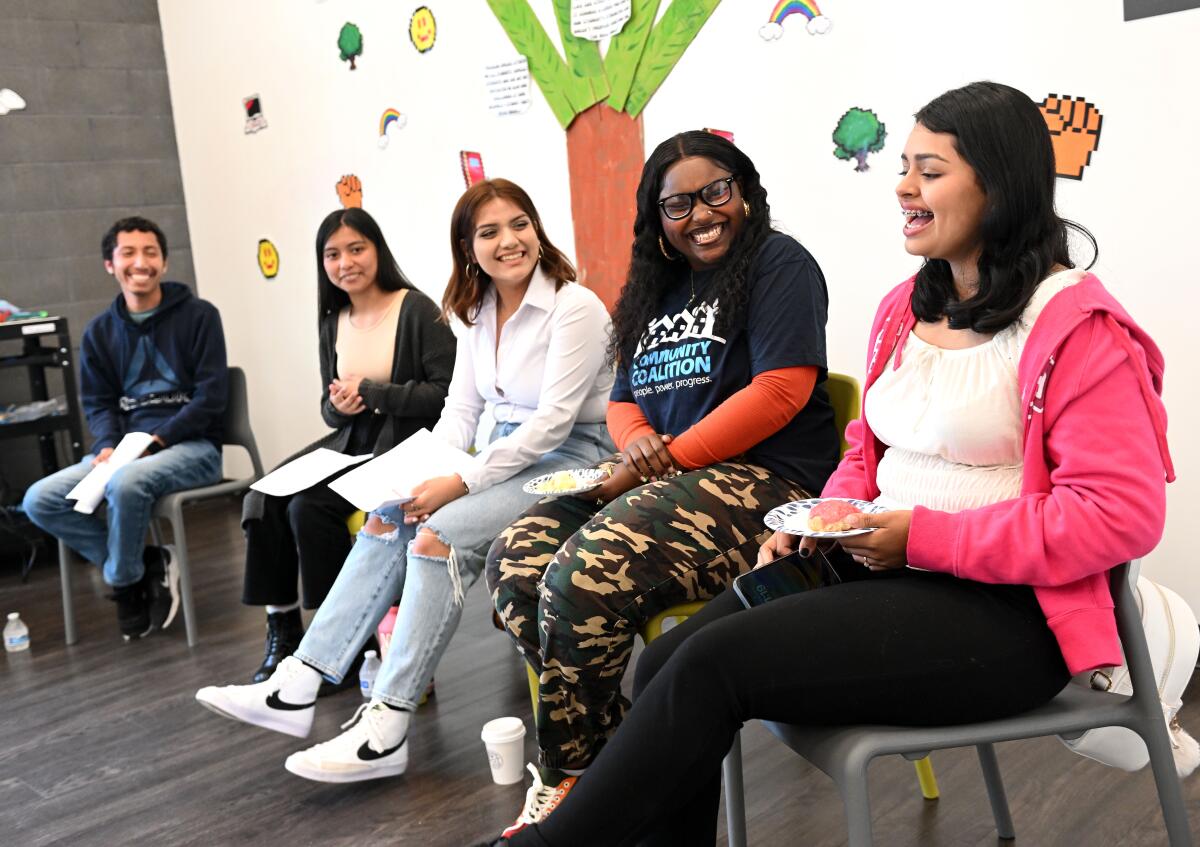
Estrella Salazar, Lincoln High School
In June 2020, both of Estrella Salazarâs parents were infected with COVID-19, isolating in their homeâs two bedrooms. One night, she woke up from her makeshift bed of blankets on the living room floor to ambulance sirens and firefighters barging into the house. Later, she was told that her father had suffered a panic attack.
When the ambulance left, the 18-year-old found herself alone, sitting on the kitchen floor. And for 10 minutes she shivered, unable to swallow or speak or move.
âIt felt like every force of gravity had disappeared,â she later wrote in a poem about the experience. It was her first anxiety attack.
A self-proclaimed people person, Estrella found her social skills decimated during the pandemic. Her voice was stripped away, literally. Once, her AP World History teacher asked her on Zoom to read the dayâs learning objective. When she opened her mouth, she found herself unable to speak. She started hyperventilating, turned the computer off and left.
Her father died unexpectedly in June 2021. Estrella, who was looking forward to going back to campus, had just started to recover from the anxiety of the pandemic. Now, she felt like she was âfalling down the rabbit hole again.â
âThis was a hundred times worse [than the pandemic]. I didnât know what life was going to look like. I had to be strong all over again. I had to relearn what strength looked like,â she said.
But she remembered what her father had often told her: You should never settle for less, no matter the situation. Keep on going until you get what you really want.
What she wanted was to attend her dream college, the University of Southern California. Her dad had received treatments at USCâs medical center when she was growing up.
âIn my mind, they were his heroes. So I wanted to be part of this bigger being,â she said. âI wanted to put myself in those spaces.â
Estrella spent the summer between sophomore and junior year studying and working at Old Navy. She was elected student body president, letting students know ânobodyâs alone.â High schoolers today live in a world âa little less than lonely and more than scary.â
She submitted her application to USC early. When she found out she was deferred, she cried but didnât tell anyone. In May, after an English class discussion about Lorraine Hansberryâs âA Raisin in the Sunâ and deferred dreams, an email hit her inbox. She had been accepted.
This fall, sheâll study political science with a full scholarship, courtesy of the Jordan Brand Wings Program. One day, she hopes to be a congresswoman or a senator.
âI want to be the one sitting in the chair, making those decisions and hearing my people,â she said.
But that is years away. Right now, there is only summer. There are museums to visit and jobs to look for. A list of Los Angeles music venues to check off. A boyfriend and brothers to say goodbye to.
âI really want to take this all in,â Estrella said. âI did it.â
More to Read
Sign up for Essential California
The most important California stories and recommendations in your inbox every morning.
You may occasionally receive promotional content from the Los Angeles Times.



